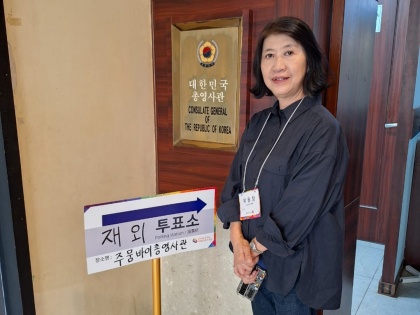South Koreans in India Are Voting, Too. Here's What You Need To Know
By Durga Yesade | Updated: April 1, 2024 14:20 IST2024-04-01T14:15:02+5:302024-04-01T14:20:54+5:30
Mumbai: Located on the 12th floor of a corporate building in Worli, the Korean Consulate of Mumbai has seen ...

South Koreans in India Are Voting, Too. Here's What You Need To Know
Mumbai: Located on the 12th floor of a corporate building in Worli, the Korean Consulate of Mumbai has seen a large number of visitors since March 27. Neighboring the consulate is one of Lokmat’s Mumbai offices, and the sign outside the Consulate tells us that some kind of election process is underway. We managed to reach out to a volunteer and found out that the consulate is serving as the polling station for Korean nationals living in India who wish to vote in their country’s 22nd National Assembly elections.
The year 2024 is admittedly the biggest electoral year in history. Half of the world’s population across Asia, the Americas, Europe, and Africa will vote for their representative in different capacities. From Taiwan to Mexico and from the USA to India, elections this year are bound to have long-lasting consequences for the global order. The Republic of Korea, also known as South Korea, is one of the 64 countries overseeing elections. The elections for the Daehanminguk Gukhoe, the National Assembly, are conducted to elect members of the South Korean legislature. While the elections in the Korean Peninsula are scheduled for April 10, overseas Korean citizens can cast their votes in respective embassies and consulates across the world from March 27 to April 1.
Chunghee Park (Yogi), one of the volunteers lending a hand at the Mumbai consulate for elections, has a unique association with India. She has been living in the country for the past 30 years and is married into a Gujarati family. Along with her husband, she runs a travel agency, Hana Travels, that specializes in Japanese and Korean tourism. Owing to her long-standing association with India, she has been working to improve relationships between the two countries, and volunteering for elections is part of the effort. Park gives us a primer on the election process in Korea and how Koreans living in India are participating in the same. The Consulate in Mumbai is a polling station for Koreans residing in Maharashtra, Gujrat, Madhya Pradesh, Goa, etc. The Korean Embassy in New Delhi and the Consulate in Chennai are also serving as polling venues. According to Mrs. Park, out of the 300-odd Korean nationals residing in Mumbai, over half are eligible voters, and the response to the elections has been moderate.
Understanding Korean Elections
Unlike India, South Korea has a unicameral legislature, i.e., a singular house of representatives. The Republic of Korea has a presidential system, and the last elections to elect the Korean President took place in June 2022. The current elections will elect the members of the national assembly who run for a term of four years. Mrs. Park tells us that, just like India, RoK has a multiparty system with around 30 parties running for the current elections. Out of these, the People Power Party (PPP) and Democratic Party (DP) are the most prominent, with the DP holding a majority in the National Assembly.
Before 2007, Koreans living overseas could not participate in the country’s elections, a decision that was changed by a constitutional court that extended the right to vote to every Korean citizen, upholding the principle of universal suffrage.
How Overseas Korean Citizens Vote
As explained to us by Mrs. Park, every Korean who has applied for overseas residency until February 10 and has their name in the permanent register of overseas voters is eligible to vote as an overseas Korean citizen. Another way Korea differs from the Indian way of voting is that citizens register their votes through ballots.
At the polling station, voters have to present their ID card, which contains a unique number. As the number is entered into the system, a ballot sheet containing the corresponding voter’s constituency and list of candidates is obtained. Voters then enter the polling booth and use their unique stamp to mark their votes. Mrs. Park highlights that despite technological advancement, the county still relies on individualized red stamps, which are unique to each Korean citizen and are used for official businesses, including voting. The reasoning for using the conventional method is simple: digital voting can be easily manipulated, a risk that can be completely avoided through ballot sheets. After the vote is cast, voters drop their enveloped ballot sheets into a collection box. As per Mrs. Chunghee Park’s input, the Consulate General is then entrusted with taking the ballots back to Korea, which will be counted along with the votes from the April 10 polls.
More citizens walk into the Consulate as our chat with Mrs. Park continues. Elections are notoriously intricate and difficult to conduct, not to mention the extra work required when it comes to conducting them for overseas citizens. Owing to the dedicated efforts of people like Mrs. Chunghee Park, it becomes possible for Korea to reach each of its citizens, regardless of their place of residence.